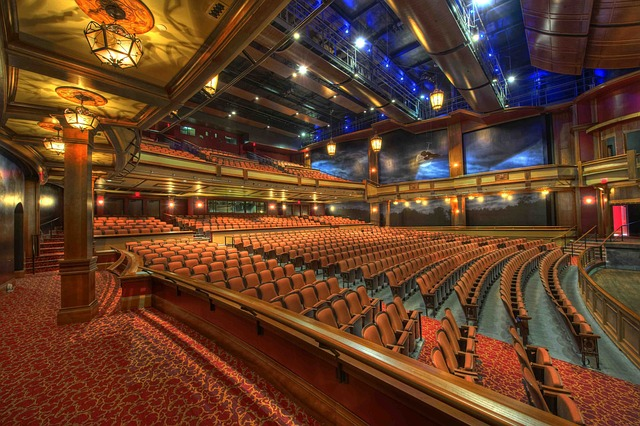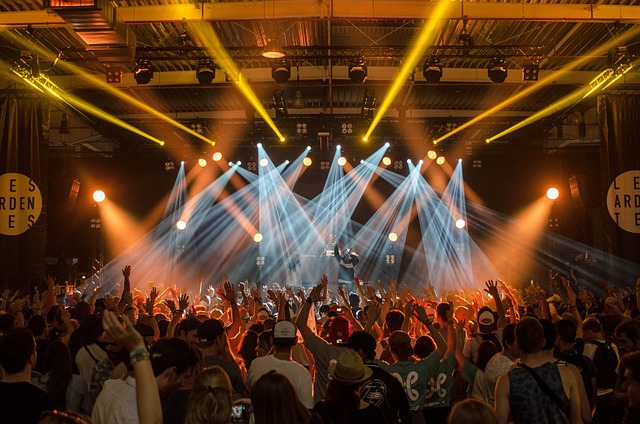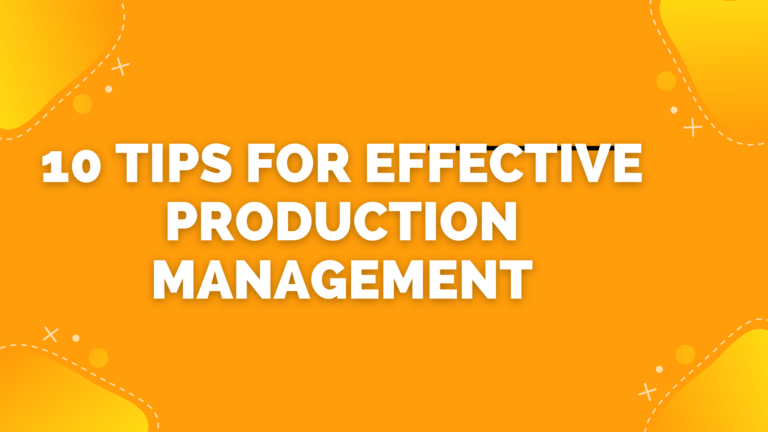What is a Production Manager? | Job, Salary & More
Behind every successful live event lies a mastermind orchestrating every detail to ensure a seamless experience for both the audience and performers. This mastermind is known as a Production Manager. In this blog post, we will delve into the world of production management, exploring the roles, responsibilities, skills, and career path of this essential figure in entertainment.
- Key Takeaways
- The Role of a Production Manager in Entertainment
- Essential Skills for a Successful Touring Production Manager
- The Career Path to Becoming a Touring Production Manager
- A Day in the Life of a Touring Production Manager
- Production Manager Salary and Job Outlook
- Summary
- Frequently Asked Questions
Key Takeaways
- Production Managers in the Entertainment Industry are responsible for overseeing personnel, technical details, logistics and budgeting.
- Essential skills include technical know-how and budget management, while a combination of education, hands-on experience & networking is typically required to become one.
- Production Managers have positive job outlook with an average salary between $68k – $136k annually.
The Role of a Production Manager in Entertainment
A Production Manager is the backbone of any live event, responsible for managing all aspects, including logistics, crew, and budgeting, to ensure a successful show.
Although Tour Managers are integral to the administration of a tour and get much of the attention outside the industry… Production Managers specialize in supervising personnel and managing technical aspects.

Touring Concert Production Manager
Touring Production Managers oversee the entire production process for a touring artist. Their responsibilities include:
- Managing crew, equipment, and logistics across multiple venues and cities
- Coordinating with department heads such as sound, lighting, and staging to ensure a smooth event
- Taking into account the particular requirements of a tour when selecting vendors to control costs and stay within budget For those interested in this field, numerous tour production manager jobs are available, offering exciting opportunities to work with various artists and events.
- Production Managers are often requires to set times for load in & soundcheck.
- Production Manager may be involved in or responsible for arranging travel (i.e. bussing, hotels, flights & runners) with the help of a Production Coordinator & a Travel Agent.
Day sheets are often used by Production Managers to keep track of the schedule and ensure all the tours tasks are completed on time. Adapting to the unique challenges of each venue and city is a key factor in a touring production manager’s success.
From the moment the trucks arrive at the venue until the end of the concert, it is their duty to ensure everything runs smoothly. They supervise the entire day, working closely with the Stage Manager & key crew members to guarantee a flawless event.
Essential Skills for a Successful Touring Production Manager

A touring Production Manager must possess a diverse skill set to excel in their role. These include:
- Leadership qualities
- Technical proficiency
- Problem-solving aptitude
- Budget acumen
A Production Manager must also be proficient in leadership as they need to manage a large team of touring crew, local crew, vendors, venue staff, and musicians.
A strong grasp of each department in understanding the various aspects of a live event, such as sound, lighting, and video. A Production Manager must also be well-versed in the latest technology and gear used in production to ensure proper deployment during live shows.
Technical Knowledge
A Touring Production Manager needs to understand the different facets of a live event, from sound and lighting to staging and rigging, which requires a solid foundation. Most production managers have a background in at least 2 different disciples, so that they can keep an eye on the big picture.
It is not uncommon for a production manager to have another showtime role. It’s common to have a Front of House Engineer double as a Production Manager. Also common is the Monitor Engineer acting as a PM.
Budget Management
A Production Manager will need budget management prowess to keep the event within financial constraints, while still delivering a high-quality experience. This includes:
- Preparing a budget
- Analyzing financial statements
- Engaging stakeholders
- Negotiating contracts
- Managing risks
- Crisis Management
- Leading the Crew
Analytical thinking, time management, and collaborative skills are also crucial for a Production Manager when managing a budget.
Effective management and allocation of resources by a Production Manager ensures the event’s success, without compromising the quality of the experience for the audience and the performers.
The Career Path to Becoming a Touring Production Manager

The career path to becoming a Production Manager often involves a combination of education, hands-on experience, and networking within the industry. While a bachelor’s degree in fields such as:
- business administration
- management
- engineering
- film
- audio production
… can help. Many Production Managers gain valuable knowledge and skills through college programs or by starting their careers immediately after high school.
Education and Experience
Many Production Managers, even though formal education is not mandatory, gain valuable knowledge and skills through college programs. By pursuing a degree in a related field, aspiring Production Managers can acquire an in-depth understanding of the industry and the necessary skills to excel in their roles. However, launching a career right after high school can offer Production Managers practical experience and the chance to grow through on-the-job training.
Networking and Professional Development
For aspiring Production Managers, networking and professional development are vital as they can lead to job opportunities and career growth by building connections within the industry. Some essential networking skills for Production Managers include:
- Attending professional gatherings
- Establishing connections with experts
- Obtaining recommendations
- Remaining active in online forums
- Honing strong communication abilities
These skills will help you build a strong network and open doors for job opportunities and career advancement.
Additionally, engaging in multiple projects and gaining exposure to assorted facets of production can facilitate the acquisition of the necessary skills and understanding to become a production manager.
A Day in the Life of a Touring Production Manager

A typical day for a Production Manager involves preparing for the show, managing load in, and ensuring a smooth event from start to finish. Their day usually begins around 6:30 or 7:00 am, walking the venue and meeting the local venue team.
Throughout the day, a Production Manager may encounter issues or challenges such as gear malfunctions or staffing shortages, requiring them to put their problem-solving skills to the test.
Preparing for the Show
Preparing for the show includes advance work, coordinating with vendors, and communicating with the crew to ensure all aspects of the event are ready. A Production Manager should proactively plan for the event by researching the venue, confirming technical requirements, and ensuring that all necessary production elements are available to anticipate any potential issues.
Additionally, a Production Manager should take the necessary steps to ensure that all equipment is available and any special requests are fulfilled, such as confirming the delivery and setup of equipment and verifying that all paperwork is completed.
During the Event
During the event, a Production Manager oversees all technical and logistical aspects, ensuring safety, efficiency, and a seamless experience for both the audience and performers. This includes:
- Monitoring production schedules and cost adjustments
- Executing the event plan
- Guaranteeing that everything runs smoothly and efficiently
- Negotiating and finalizing agreements
- Monitoring budgets
- Scheduling and acquiring production personnel
Their success hinges on their ability to adapt and find innovative solutions to any issues that may arise during a production.
Production Manager Salary and Job Outlook

Production Manager salaries can vary depending on experience and the size of the event. Factors such as location, artist popularity, & travel requirements also play a role in determining the salary of a Production Manager. The average base salary for a Production Manager is estimated to be between $68,968 and $136,951 annually.
The job outlook for Production Managers in touring remains positive due to the ongoing demand for live entertainment. As long as there is a need for live events, there will be a demand for skilled PM to ensure the success of these events.
Summary
In conclusion, Production Managers play a vital role in the entertainment industry, overseeing all aspects of live events and ensuring a seamless experience for both the audience and performers. With a diverse skill set, including technical knowledge, problem-solving aptitude, leadership, and budget management, PMs are the linchpin that holds live shows together. As the demand for live entertainment continues to grow, so too will the need for skilled Production Managers to orchestrate and manage these events, guaranteeing unforgettable experiences for all.
Frequently Asked Questions
What is the job qualification of a production manager?
To qualify for a production manager position, applicants typically need prior experience in production, and a deep understanding of the norms surrounding show execution. Excellent organizational, time, and leadership skills are also essential.
What is a production manager in a factory?
As a production manager, you’ll plan and coordinate the activities of a production team to ensure that all resources are available to meet required deadlines. You’ll draw up production plans, manage schedules, estimate costs, prepare budgets and set quality standards.
Who is a good production manager?
A good touring production manager has a diverse skill set that combines technical knowledge, leadership abilities, problem-solving skills, strong organisational aptitude, effective communication and a keen eye for detail. They must also be familiar with industry-specific software and lean manufacturing principles.
What does a tour production manager do?
As Production Manager, one is responsible for overseeing the entire show, from arrival of trucks to departure – managing gear, crew and Artist at the stage.
What is the difference between a tour manager and a production manager?
A tour manager oversees the day-to-day details of a tour, while a production manager is responsible for overseeing the crew and more specialized tasks. Both often work in tandem to ensure the tour runs smoothly.



